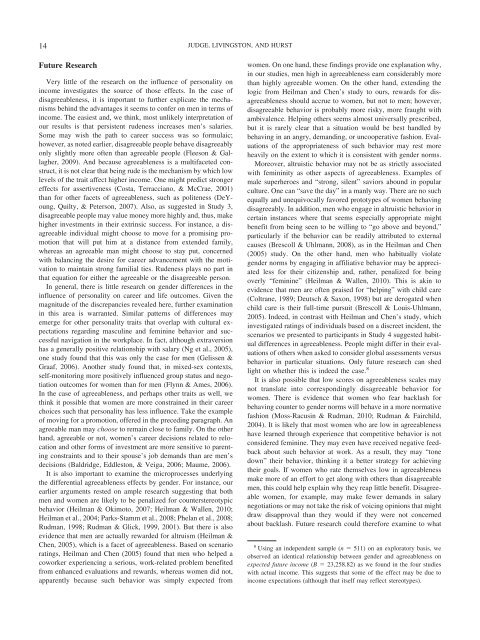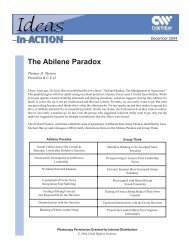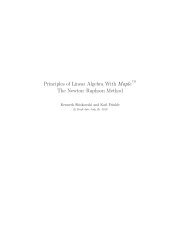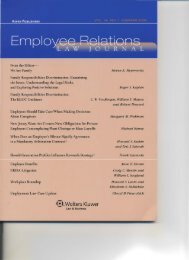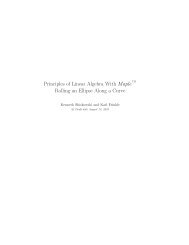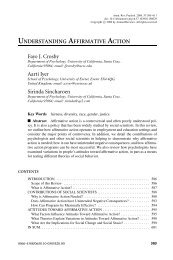Do Nice Guysâand GalsâReally Finish Last - Southeastern ...
Do Nice Guysâand GalsâReally Finish Last - Southeastern ...
Do Nice Guysâand GalsâReally Finish Last - Southeastern ...
You also want an ePaper? Increase the reach of your titles
YUMPU automatically turns print PDFs into web optimized ePapers that Google loves.
14 JUDGE, LIVINGSTON, AND HURST<br />
Future Research<br />
Very little of the research on the influence of personality on<br />
income investigates the source of those effects. In the case of<br />
disagreeableness, it is important to further explicate the mechanisms<br />
behind the advantages it seems to confer on men in terms of<br />
income. The easiest and, we think, most unlikely interpretation of<br />
our results is that persistent rudeness increases men’s salaries.<br />
Some may wish the path to career success was so formulaic;<br />
however, as noted earlier, disagreeable people behave disagreeably<br />
only slightly more often than agreeable people (Fleeson & Gallagher,<br />
2009). And because agreeableness is a multifaceted construct,<br />
it is not clear that being rude is the mechanism by which low<br />
levels of the trait affect higher income. One might predict stronger<br />
effects for assertiveness (Costa, Terracciano, & McCrae, 2001)<br />
than for other facets of agreeableness, such as politeness (DeYoung,<br />
Quilty, & Peterson, 2007). Also, as suggested in Study 3,<br />
disagreeable people may value money more highly and, thus, make<br />
higher investments in their extrinsic success. For instance, a disagreeable<br />
individual might choose to move for a promising promotion<br />
that will put him at a distance from extended family,<br />
whereas an agreeable man might choose to stay put, concerned<br />
with balancing the desire for career advancement with the motivation<br />
to maintain strong familial ties. Rudeness plays no part in<br />
that equation for either the agreeable or the disagreeable person.<br />
In general, there is little research on gender differences in the<br />
influence of personality on career and life outcomes. Given the<br />
magnitude of the discrepancies revealed here, further examination<br />
in this area is warranted. Similar patterns of differences may<br />
emerge for other personality traits that overlap with cultural expectations<br />
regarding masculine and feminine behavior and successful<br />
navigation in the workplace. In fact, although extraversion<br />
has a generally positive relationship with salary (Ng et al., 2005),<br />
one study found that this was only the case for men (Gelissen &<br />
Graaf, 2006). Another study found that, in mixed-sex contexts,<br />
self-monitoring more positively influenced group status and negotiation<br />
outcomes for women than for men (Flynn & Ames, 2006).<br />
In the case of agreeableness, and perhaps other traits as well, we<br />
think it possible that women are more constrained in their career<br />
choices such that personality has less influence. Take the example<br />
of moving for a promotion, offered in the preceding paragraph. An<br />
agreeable man may choose to remain close to family. On the other<br />
hand, agreeable or not, women’s career decisions related to relocation<br />
and other forms of investment are more sensitive to parenting<br />
constraints and to their spouse’s job demands than are men’s<br />
decisions (Baldridge, Eddleston, & Veiga, 2006; Maume, 2006).<br />
It is also important to examine the microprocesses underlying<br />
the differential agreeableness effects by gender. For instance, our<br />
earlier arguments rested on ample research suggesting that both<br />
men and women are likely to be penalized for counterstereotypic<br />
behavior (Heilman & Okimoto, 2007; Heilman & Wallen, 2010;<br />
Heilman et al., 2004; Parks-Stamm et al., 2008; Phelan et al., 2008;<br />
Rudman, 1998; Rudman & Glick, 1999, 2001). But there is also<br />
evidence that men are actually rewarded for altruism (Heilman &<br />
Chen, 2005), which is a facet of agreeableness. Based on scenario<br />
ratings, Heilman and Chen (2005) found that men who helped a<br />
coworker experiencing a serious, work-related problem benefited<br />
from enhanced evaluations and rewards, whereas women did not,<br />
apparently because such behavior was simply expected from<br />
women. On one hand, these findings provide one explanation why,<br />
in our studies, men high in agreeableness earn considerably more<br />
than highly agreeable women. On the other hand, extending the<br />
logic from Heilman and Chen’s study to ours, rewards for disagreeableness<br />
should accrue to women, but not to men; however,<br />
disagreeable behavior is probably more risky, more fraught with<br />
ambivalence. Helping others seems almost universally prescribed,<br />
but it is rarely clear that a situation would be best handled by<br />
behaving in an angry, demanding, or uncooperative fashion. Evaluations<br />
of the appropriateness of such behavior may rest more<br />
heavily on the extent to which it is consistent with gender norms.<br />
Moreover, altruistic behavior may not be as strictly associated<br />
with femininity as other aspects of agreeableness. Examples of<br />
male superheroes and “strong, silent” saviors abound in popular<br />
culture. One can “save the day” in a manly way. There are no such<br />
equally and unequivocally favored prototypes of women behaving<br />
disagreeably. In addition, men who engage in altruistic behavior in<br />
certain instances where that seems especially appropriate might<br />
benefit from being seen to be willing to “go above and beyond,”<br />
particularly if the behavior can be readily attributed to external<br />
causes (Brescoll & Uhlmann, 2008), as in the Heilman and Chen<br />
(2005) study. On the other hand, men who habitually violate<br />
gender norms by engaging in affiliative behavior may be appreciated<br />
less for their citizenship and, rather, penalized for being<br />
overly “feminine” (Heilman & Wallen, 2010). This is akin to<br />
evidence that men are often praised for “helping” with child care<br />
(Coltrane, 1989; Deutsch & Saxon, 1998) but are derogated when<br />
child care is their full-time pursuit (Brescoll & Louis-Uhlmann,<br />
2005). Indeed, in contrast with Heilman and Chen’s study, which<br />
investigated ratings of individuals based on a discreet incident, the<br />
scenarios we presented to participants in Study 4 suggested habitual<br />
differences in agreeableness. People might differ in their evaluations<br />
of others when asked to consider global assessments versus<br />
behavior in particular situations. Only future research can shed<br />
light on whether this is indeed the case. 8<br />
It is also possible that low scores on agreeableness scales may<br />
not translate into correspondingly disagreeable behavior for<br />
women. There is evidence that women who fear backlash for<br />
behaving counter to gender norms will behave in a more normative<br />
fashion (Moss-Racusin & Rudman, 2010; Rudman & Fairchild,<br />
2004). It is likely that most women who are low in agreeableness<br />
have learned through experience that competitive behavior is not<br />
considered feminine. They may even have received negative feedback<br />
about such behavior at work. As a result, they may “tone<br />
down” their behavior, thinking it a better strategy for achieving<br />
their goals. If women who rate themselves low in agreeableness<br />
make more of an effort to get along with others than disagreeable<br />
men, this could help explain why they reap little benefit. Disagreeable<br />
women, for example, may make fewer demands in salary<br />
negotiations or may not take the risk of voicing opinions that might<br />
draw disapproval than they would if they were not concerned<br />
about backlash. Future research could therefore examine to what<br />
8 Using an independent sample (n 511) on an exploratory basis, we<br />
observed an identical relationship between gender and agreeableness on<br />
expected future income (B 23,258.82) as we found in the four studies<br />
with actual income. This suggests that some of the effect may be due to<br />
income expectations (although that itself may reflect stereotypes).


